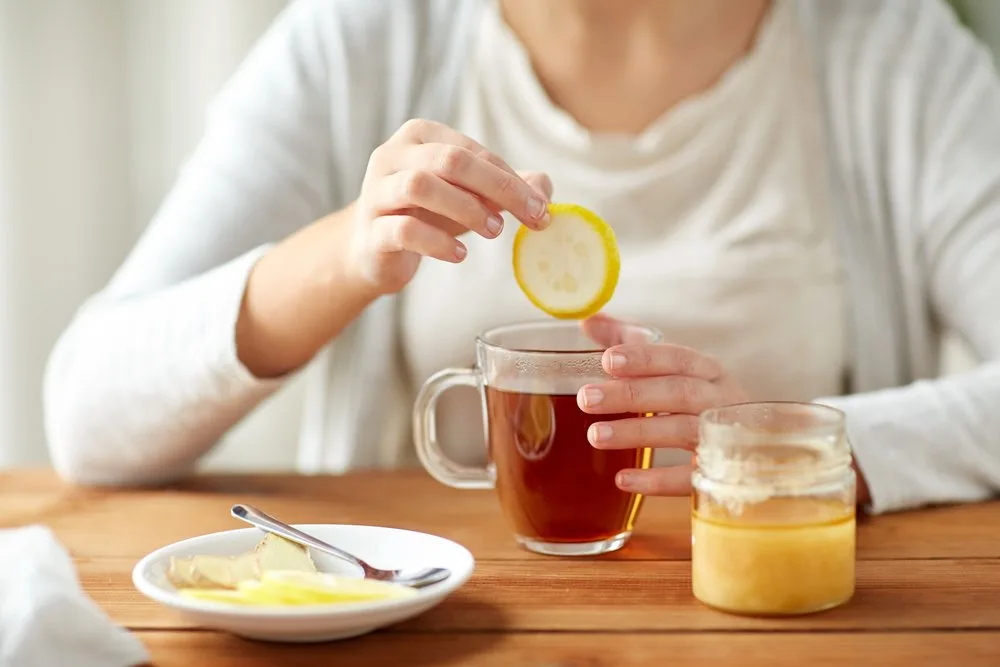From cocktail parties and Christmas feasts to New Year’s Eve festivities, the end-of-year holidays are synonymous with social gatherings and delicious. Yet, often rich, indulgent food and alcoholic excesses can become a challenge for the digestive system and your gut health.
Healthy Gut During The Holidays
Researchers claim that herbal drinks, like Rooibos, which is indigenous to South Africa and derived from the leaves of the Aspalathus linearis plant, may prove useful in alleviating discomfort from overeating.
Dr. Hanel Sadie-Van Gijsen, a senior researcher at the Centre for Cardiometabolic Research in Africa (CARMA) within the Division of Medical Physiology at Stellenbosch University, says recent studies have demonstrated that rooibos can improve various aspects of gut health and digestion while alleviating inflammation and discomfort.
She says that one of the most prominent traditional uses of rooibos was to treat a variety of stomach and gut ailments, but until recently the scientific basis for this has not been studied in much detail.
However, recent studies conducted by Stellenbosch University (SU), the University of KwaZulu-Natal (UKZN), SA Medical Research Council (SAMRC), and Cape Peninsula University of Technology (CPUT), along with other international research centers focused on nutrition, microbiology, and health sciences all demonstrate a variety of actions that rooibos exerts in the gut that not only aids digestion but also improves overall health and assists with disease management.
All about the gut
The gut microbiome is the collective name for all the microorganisms that live in our digestive system, but they mostly reside in the colon (large intestine).
Yes, Dr. Hanel Sadie-Van Gijsen admits that the gut microbiome is technically not a physical part of our bodies. Yet, its function is so crucial to our health and well-being that we must view it as part of our bodies, and we must take care of it accordingly.
“A healthy gut microbiome helps us to efficiently extract nutrients from our food, it assists in our immune response, supports the intestinal barrier function, reduces intestinal inflammation, improves metabolic function, and even protects our brain health.”
Rooibos for gut health
“Rooibos, which is rich in polyphenols – a large family of plant bioactive compounds – has a proven prebiotic effect, which supports the growth of beneficial gut bacteria, while restoring and maintaining intestinal balance.
“Polyphenols in Rooibos have a double benefit in that they inhibit the growth of harmful gut bacteria and stimulate the growth of beneficial gut bacteria. The prebiotic effect of Rooibos polyphenols has also been shown to reduce blood markers of inflammation, therefore lowering the risk of disease.
“Beyond the impact of Rooibos on gut bacteria, the tisane also has several other advantageous effects on the gut. Researchers at UKZN have shown that hot water infusions prepared from fermented (red) Rooibos tea bags (essentially how we would prepare a cup of tea at home) inhibited glucose uptake by the intestine. This action may assist in blood glucose control.
“Work performed in India found that orientin, a polyphenol found in both green and fermented Rooibos, successfully inhibited chemically induced colorectal cancer in mice. Other studies have shown that fermented Rooibos has anti-cramping and anti-diarrheal effects by balancing the actions of potassium and calcium ions in the gut, thereby achieving smooth muscle relaxation. Rooibos also reduces intestinal fluid release to alleviate diarrhea.”
The field of gut health and probiotic/prebiotics continues to evolve. Additional research on Rooibos’ actions in the gut and microbiota is sure to build on the existing evidence. This suggests that Rooibos can safely be consumed by adults and children as a daily support for gut health, in combination with a balanced diet and healthy lifestyle practices.
Benefits of Rooibos for Gut Health
1. Anti-inflammatory properties
Rooibos contains polyphenols such as flavonoids and dihydrochalcones that possess anti-inflammatory properties. These compounds help reduce inflammation in the gastrointestinal tract, potentially easing digestive discomfort.
2. Antioxidant effects
The antioxidants in Rooibos, such as quercetin and aspalathin (in green Rooibos), can help neutralize harmful free radicals in the body. By reducing oxidative stress, the tisane may contribute to overall gut health.
3. Prebiotic potential
Rooibos’ bio-active compounds act as prebiotics, supporting the growth and activity of beneficial gut bacteria. This could contribute to a healthier gut microbiome and improve overall metabolic health.
4. Relieving tummy turmoil
Rooibos has anti-spasmodic properties, which means it can relieve the cramping of the stomach and intestines. Being caffeine-free, Rooibos also normalizes intestinal fluid release, and together with its prebiotic effects, these actions can help alleviate diarrhea.
5. No oxalic acid
Unlike some other teas, Rooibos does not contain oxalic acid. In excessive amounts, oxalic acid may contribute to kidney stones or interfere with mineral absorption. This absence makes it a favorable choice for those concerned about these issues.
Want to know more?
It’s the season of indulgence, so healthy eating may seem impossible. Luckily, there are plenty of anti-aging holiday foods that can tickle your taste buds and even provide anti-aging benefits for your skin.
References
Thangaraj K, Balasubramanian B, Park S, Natesan K, Liu W, Manju V. Orientin Induces G0/G1 Cell Cycle Arrest and Mitochondria Mediated Intrinsic Apoptosis in Human Colorectal Carcinoma HT29 Cells. Biomolecules. 2019 Aug 27;9(9):418. doi: 10.3390/biom9090418. PMID: 31461995; PMCID: PMC6770649.



![women [longevity live]](https://longevitylive.com/wp-content/uploads/2020/01/photo-of-women-walking-down-the-street-1116984-100x100.jpg)










